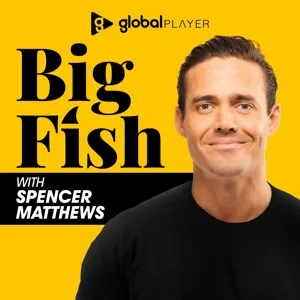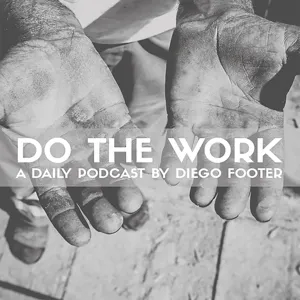#725 - Seerut Chawla - The Problem With Taking Therapy Advice From Instagram

Explore "childhood development" with insightful episodes like "#725 - Seerut Chawla - The Problem With Taking Therapy Advice From Instagram", "Social Phobia and Bullying", "Big Fish and Chip: Are you addicted to your phone?", "50. Stress on the brain and how to reverse the effects" and "48. Lets break down attachment theory / styles" from podcasts like ""Modern Wisdom", "Psychology Unplugged", "Big Fish with Spencer Matthews ", "Do You F*cking Mind?" and "Do You F*cking Mind?"" and more!



Welcome to our second bonus episode of Big Fish - where each week I'm joined by my former therapist, Chip Somers, to unpack what's going on in my life and learn how we can all become the best versions of ourselves. This week we're tackling social media - and how damaging it is to our mental health and relationships.
What we cover in this episode:
3’00 - Why negatives comments stick
5’00 - What’s the impact on young children?
8’00 - Are we now struggling to communicate our feelings?
12’45 - What’s the impact of technology addiction on society?
18'00 - Top tips on reducing your usage

The stress episode is here. This one is full of science facts, brain anatomy and some cool shit about epigenetics and how our behaviours can influence our genes. This will hopefully get you thinking about your brain health and how to optimize it.
See omnystudio.com/listener for privacy information.

See omnystudio.com/listener for privacy information.



Ask an adult, especially if they're struggling in life, what caused them to end up the way they did, and they might cite certain factors from their childhood, like having a mother that was too cold.
The problem here, of course, is that memories change over time, and narratives about the past develop to fit one's current situation.
My guests today work on the kind of research that corrects this problem to figure out how aspects of childhood truly affect adulthood, by studying humans from the time they're babies through middle age and beyond. Their names are Jay Belsky and Terrie Moffitt, and they're professors of human development, and two of the four contributors to The Origins of You: How Childhood Shapes Later Life. To begin our conversation, Jay and Terrie discuss the longitudinal studies they and their colleagues have used to track people over decades of their lives, and how aggressiveness and shyness in childhood end up impacting adulthood. We then discuss the limitations of the famous marshmallow experiment, and what these more expansive longitudinal studies have shown about the importance of self-control in achieving a successful adulthood. We unpack whether the negative outcomes associated with being bullied in childhood are inevitable, who's most likely to become a bully, and who's most likely to be bullied (which as it turns out, isn't a matter of being fat or wearing glasses). We discuss how children who act out in childhood, but avoid making certain mistakes in adolescence, can still turn out okay, and why you probably shouldn't worry about children who were good kids, but get into a little trouble in their teen years. We also dig into the impact that childcare has on kids, and the role that genes play in development. We end our conversation with some allowance-related ideas for cultivating greater self-control in your kids.
Get the show notes at aom.is/childhood.


In the early 90s, a new study that found that kids who are exposed to more germs early in life are less likely to develop allergies later. With the West in the grip of a full-blown immunity crisis (still going on today), this was an interesting thought.
Learn more about your ad-choices at https://www.iheartpodcastnetwork.com
See omnystudio.com/listener for privacy information.



A fascination with fire is part of every kid’s childhood, but it’s meant to be passing. For some people, fire becomes the central focus of life, and the urge to set a fire becomes an irresistible impulse. We think.
Learn more about your ad-choices at https://www.iheartpodcastnetwork.com
See omnystudio.com/listener for privacy information.

#143
DO THE WORK PODCAST:
A dailyish show focusing on the reality of being a dad, running multiple businesses and all of the organization, productivity, and lifehacking that is in place to make it all work. The show will make you cry, laugh, like me, and hate me, but most importantly it will remind you to remember what is truly important in your life.
Follow Me:
Instagram: @DiegoFooter: http://bit.ly/2B3vprJ
YouTube: Diego Footer: http://bit.ly/SubtoDiego
Podcast: DO THE WORK: https://apple.co/2ERsLHZ
Produced by podcaster, entrepreneur, and dad of three daughters - Diego Footer.

While it’s now America’s favorite pastime, football was on the verge of extinction as soon as the game was forming around the 20th century. Severe injuries and even death were common in the early days of football as players used little or no protection and the rules of the game encouraged ruthless play. Many university presidents and other social leaders called for the game’s prohibition and came close to getting their way, that is until President Teddy Roosevelt stepped in. Our guest today has written a book on how TR helped save football. His name is John Miller and his book is called The Big Scrum: How Teddy Roosevelt Saved Football.
Stay up to date
For any inquiries, please email us at hello@podcastworld.io